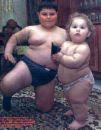CHIDHOOD OBESITY IS NO LAUCHING MATTER

How many times have we seen more-than-chubby children, pulled their cheeks lovingly, and exclaimed,”How cute”. It’s time for a reality check. Childhood obesity is on a rapid rise in this country, in keeping with an unhealthy global trend: in 2007, an estimated 22 million children under; the age of five years were overweight according to the world health organization, and more are expected to join the abese club.
In an alarming report presented this week by the American Heart Association, the thickness of the artery walls of teenagers who are abese were reported to resemble the thickness of an average 45 year-old’s artery walls. In other words, evidence was presented that obese children show early warning signs of heart disease. Childhood obesity is also linked to other serious health complications including juvenile diabetes. We can no longer dismiss it as a problem of the West. We might not be grappling with a problem as huge as the US-where childhood obesity is considered an epidemic-or the UK. But trouble is knocking on our doors, as well as those of other developing countries like China, Brazil and Thailand.
A recent ‘Indian Pediatrics’ report makes this point. Unlike in much of the West, where childhood obesity is more prevalent among low-income gro9ups, in India it is a malaise that afflicts the better off. The prevalence of obesity is higher in the upper socio-economic class (4.8 percent) as compared to the lower socio-economic class (1 percent). In urban Delhi, about 37 percent of children are either overweight or obese. Medical experts attribute; the weighty troubles of developing countries to changed attribute the weighty troubles of developing countries to changed dietary habits-read on overdose of fast and processed foods-and a steep drop in levels of physical activity.
An unhealthy diet is partly a function of the greater access and choice that the expanding middle class has. And partly because of the compulsions of modern urban life, where both parents often work and prefer quick and easy processed food options rather than cooking every meal from scratch. City children today are also more inclined to spend leisure as couch or mouse potatoes, which does not help in the battle against the bulge. Concerted efforts involving schools, families and government to tackle juvenile obesity are in the order. For a start policymakers must invest in educating parents, especially mothers about the perils of childhood obesity. And it would be of immense help if we, as society, got over our peculiar proclivity to associate overweight-specially when it concerns children-with ‘well-fed’ and ‘healthy’.
In an alarming report presented this week by the American Heart Association, the thickness of the artery walls of teenagers who are abese were reported to resemble the thickness of an average 45 year-old’s artery walls. In other words, evidence was presented that obese children show early warning signs of heart disease. Childhood obesity is also linked to other serious health complications including juvenile diabetes. We can no longer dismiss it as a problem of the West. We might not be grappling with a problem as huge as the US-where childhood obesity is considered an epidemic-or the UK. But trouble is knocking on our doors, as well as those of other developing countries like China, Brazil and Thailand.
A recent ‘Indian Pediatrics’ report makes this point. Unlike in much of the West, where childhood obesity is more prevalent among low-income gro9ups, in India it is a malaise that afflicts the better off. The prevalence of obesity is higher in the upper socio-economic class (4.8 percent) as compared to the lower socio-economic class (1 percent). In urban Delhi, about 37 percent of children are either overweight or obese. Medical experts attribute; the weighty troubles of developing countries to changed attribute the weighty troubles of developing countries to changed dietary habits-read on overdose of fast and processed foods-and a steep drop in levels of physical activity.
An unhealthy diet is partly a function of the greater access and choice that the expanding middle class has. And partly because of the compulsions of modern urban life, where both parents often work and prefer quick and easy processed food options rather than cooking every meal from scratch. City children today are also more inclined to spend leisure as couch or mouse potatoes, which does not help in the battle against the bulge. Concerted efforts involving schools, families and government to tackle juvenile obesity are in the order. For a start policymakers must invest in educating parents, especially mothers about the perils of childhood obesity. And it would be of immense help if we, as society, got over our peculiar proclivity to associate overweight-specially when it concerns children-with ‘well-fed’ and ‘healthy’.